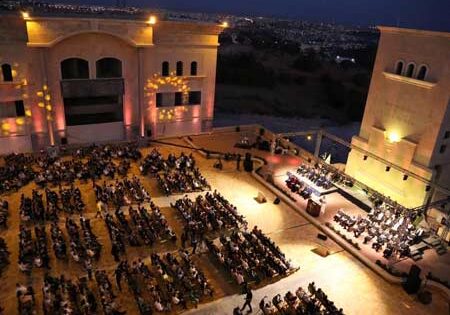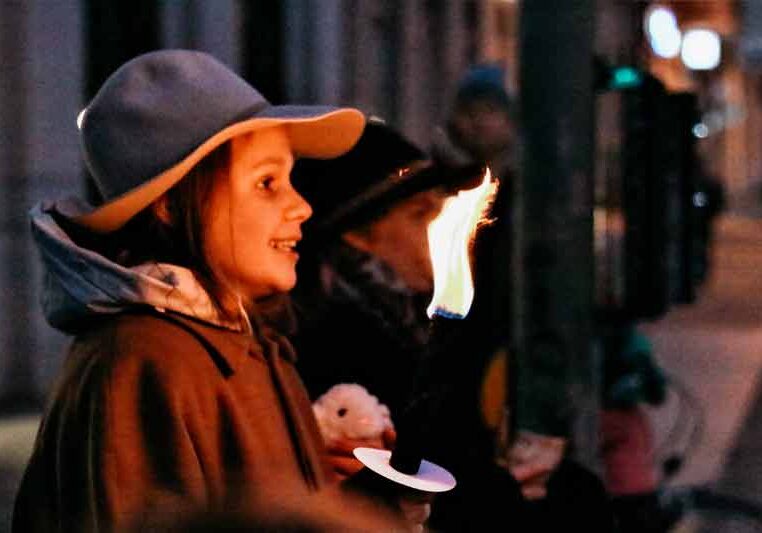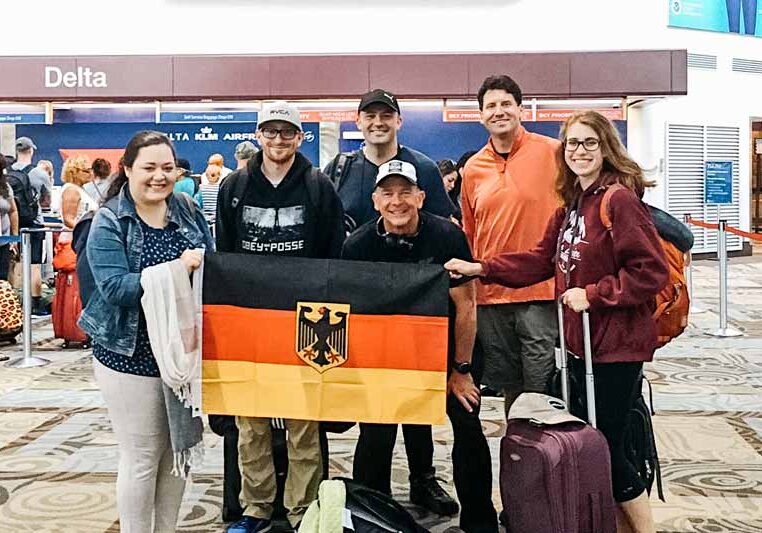
“Daddy, why doesn’t this flashlight work?”
Fellowship missionary Chris Moore—who serves with Hellenic Ministries on the island of Lesvos, Greece—took the light from his three-year-old boy and gave it a glance.
“Here, let’s put some batteries in and try again,” Chris replied to his son’s questioning gaze. He inserted batteries and then gave it to the child, who again flipped the switch.
“Daddy, it still doesn’t work,” came the reply. Chris, however, knew differently. The light was shining, but the bright Greek sunshine made it difficult to see.
Chris shares this story as he describes God’s work among refugees in Greece. For nine years, he and his wife, Amy, lived in Athens while working with refugee communities. Recently, the couple and their three young boys moved to the Greek island of Lesvos, which has gained the world’s attention since 2015 as a gathering point for refugees from across the Middle East and Africa.

During their time in Greece, Chris has seen the light of the gospel cut sharply through spiritual darkness. “Islam is a repressive religion,” he says. “Thus, the freedom and light found in Jesus and His followers can make a deep impression.” Chris and Amy have observed how God uses several things to draw people to Himself.
For instance, the refugees often ask each other, “Have you been visited yet by the man in white?” By this, they are referring to Jesus, who regularly appears to Muslims in their dreams, offering them a personal invitation to follow Him.
Also, since arriving in Greece, many refugees hear the Word of God for the first time. Overall, interest in reading the Bible is growing among Muslim populations. As an example, within the past few years, a popular Bible app reported that their highest rate of downloads per capita is coming from the strict Muslim country of Iran.

And then there’s the powerful presence of Jesus living in and through His people. Refugees are impacted by the practical love they experience at the hands of Christian workers, whose smiles exude warmth and joy. Camp volunteers can wonder if picking up trash or setting up housing are tasks worthy of the trip’s expense, but scores of refugees would reply in the affirmative, something confirmed by this amazing story:
“Several years ago, an imam from Pakistan made the arduous journey to Greece seeking political freedom. He was brought to Christ after experiencing five years of unconditional love from his Christian employers in Athens. As a Christian leader and pastor, he has baptized more than 2,000 former Muslims. He asked each one of them the same question: what was it that brought about their first small step toward Jesus? Ninety-five percent of them said it was the kindness of the Christians in the Moria camp on Lesvos. The refugees knew that the volunteers were from God.”
“We plant seeds,” Chris says, “and we see some fruit now. But much of it comes later when people settle into a new life in Europe. The Lord has taken this refugee crisis and is turning it into a means of drawing people to Himself. He’s also causing growth in the existing church. I’m hearing from Northern Europeans that newly baptized refugees are a blessing to established churches, adding a fresh spirit of worship, prayer, and revival to existing communities of faith.”

A Front-Row Seat
The number of Muslim refugees impacted by the gospel in Greece over the past few years is staggering. In fact, some call this the greatest move of God among Muslim peoples the world has ever seen. By God’s kindness, Fellowship has had a front-row seat to this amazing event. Not only have the Moores faithfully represented Fellowship for years—first in Athens and now on Lesvos—but short-term teams from Fellowship have traveled to serve on Lesvos as well.
Fellowship member Emily Bechtel, who traveled to Lesvos on two occasions, says her heart was deeply touched by what she experienced. “My time at Moria [refugee camp on Lesvos] has had a profound impact on my life. It is a place like no other, a collision of suffering, darkness, pain and scarcity. But on the other hand, there is kindness, community, generosity, perseverance, fortitude, and sacrificial love.”
Since COVID, the number of refugees on Lesvos has decreased, but the flow is steady, and opportunities for ministry abound. Fellowship will continue to pursue sending short-term teams to the island’s refugee camp. Also, the church’s young adult ministry is pursuing a partnership with Chris and Amy for the purpose of ministry and mutual encouragement.
For Chris Moore, this is encouraging news. He knows first-hand the power of witnessing God’s work among refugees. “You and I can sometimes forget how bright the light of Jesus shines in the darkness. We get used to it because we’re surrounded by it… we can take it for granted. But for those who live in darkness, the good news of the gospel stands in stark contrast to what they’ve been taught about God.”
In other words, the light of Jesus is still shining in the darkness… and the darkness has not overcome it.
On one of my last days there, my team was tasked with cleaning an iso box housing 10 Afghani families. We spent the day scrubbing the ceiling and the walls, helping these families get settled in their new “home.” Early in the afternoon, one of the young moms waved me over and proceeded to persuade me with hand gestures, since neither of us spoke the same language, I should join her, her sister, and their mother for lunch. We sat cross-legged in a 5’ x 5’ space that served as the mother’s kitchen, bedroom, and living space. Surrounding the electric skillet, they cooked a delicious pasta we ate from the skillet.
We talked with hand motions and broken English, recognizing that friendship and fellowship transcend language and cultural barriers. We were four women laughing, sharing, and shedding some tears around a pot of pasta. They generously offered me a large serving of their precious yogurt and a pastry that they had stored away. This sweet family who had fled, leaving everything behind, with only the few mismatched belongings given to them, was sharing their valuable, few earthly possessions with me. This gesture was deeply humbling and incredibly generous.
We said goodbye later that afternoon. Hugging, Zarmina profusely thanked us for helping them clean, telling me she would never forget me. I left feeling I had been the abundant recipient of our encounter and will never forget her nor our lunch and her generous hospitality.
Emily Bechtel




